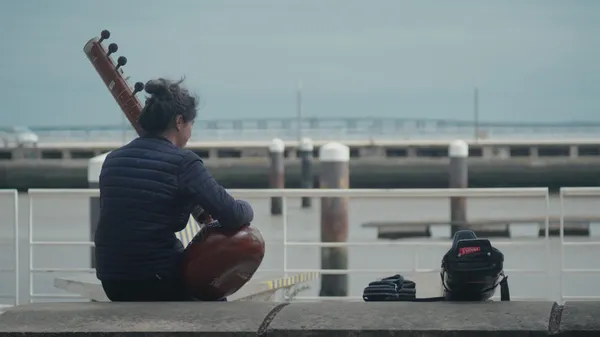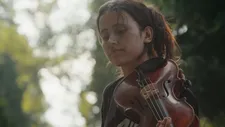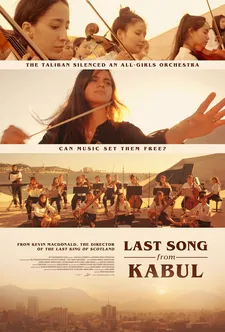 |
| Last Song From Kabul Photo: DOC NYC |
A tribute to the courage of a group of girls who made a daring escape as Afghan civic society collapsed, and an ode to the musical traditions that the Taliban are trying to destroy, Kevin Macdonald and Ruhi Hamid’s short documentary Last Song From Kabul is one of the strongest contenders on this year’s Oscar shortlist. It’s thrilling to watch as it pieces together events using footage recorded at the time, and one hopes that it will serve to remind people that for all their silence on the world stage, Afghan women – and many others there too – remain in desperate need of help.
Kevin and I met up a few days after he got the news about the Oscars. He was understandably excited, especially because, though he’s known for accomplished features like The Last King Of Scotland and The Mauritanian (which he and I discussed back in 2021), this is his first ever short film. The story of the girls and their orchestra was first brought to his attention by a producer he had worked with, Lawrence Elman, and he immediately set out to contact their representative.
“Quite a few other people wanted to do the story, but were lucky enough to persuade them to let us do it with them,” he says. “That was at the point where the girls were in Qatar, in Doha. I sent a camera person out there who traveled on the plane with them when they went to Portugal, because when they left Afghanistan, they spent a couple of months in transit in Qatar before arriving there.
“Originally it was just a film about music. It was going to be really them arriving and then them playing together, and were going to film them playing several pieces. I imagined it was going to be a fundraiser for them to use to help rebuild the coffers of the school so they could carry it on in Portugal. But then the more I got to know the girls, first of all, I realised that a lot of them didn't have instruments, and they hadn't played for six months or more since the Taliban took power. They hadn't been able to play, and a lot of them were quite obviously traumatised, so having the focus to play an instrument was not always something that they found easy to do.
“We were watching them struggling to re-engage with music and struggling as refugees to cope with this huge rupture in their lives where they've left their homeland and left their own language. They had all made the decision they wanted to leave. Some of them certainly could have gone back to their villages and put on a burka and disappeared, and nobody would have known. But they all decided that no music was so important that they couldn't live without music. And that was just sort of extraordinary to me. Music can be that important to you, that you're prepared to leave your family, leave your country, to carry on playing it.”
 |
| Last Song From Kabul |
I tell him that it struck me that maybe music is more important to people from really poor rural communities because they don't have anything else. They don't have all the other forms of entertainment that we're used to.
“Well, the thing is, in Afghanistan, they've got a very complex relationship with music. There was a traditional Afghan music, Afghan instruments. But then when the Taliban first came to power in the Eighties, they banned music because they were such extreme, puritanical people. They destroyed tapes and records and destroyed instruments, and a lot of musicians fled the country, including Dr. Sarmast, who's the guy who founded the school. He was a refugee in Australia, he studied musicology in Australia. And then when the Americans went in, in 2002, he went back and tried to start the music school.
“He was trying to rescue what was left of traditional Afghan musical culture. So in the school, they learned classical Western music, but they also learned classical and popular Afghan music. When the girls arrive in Portugal, Dr. Sarmast gets on the plane and he makes this speech about how they are the guardians now of Afghan musical culture. They've got a real duty to preserve the musical culture of their country. It's not going to continue in Afghanistan, obviously. So, yeah, it's really interesting when they play the piece at the end, they're playing a combination of Afghan instruments and Western style instruments.”
I mention that I spoke with Elham Ehsas, director of this year’s other Oscar-shortlisted Afghan-focused short (Yellow), last year, and that Elham stressed the importance of not letting stories like these be lost.
“I think this film preserves the story of the music school, how it was established and how important it was, and of these girls and how determined they were to continue playing, how important music was to them,” he says. “I think, looking back in 50 years time, it will be an amazing document on Afghanistan, assuming that the Taliban are no longer there. And I think it'll make Afghans really admire these young women. I've never made a film before which I feel so much is their film. I'm just the conduit for their story.”
I ask how the film came to focus primarily on one particular girl, Marzia.
“Well, obviously, I'm known as a feature maker and I've never made a short, so I found it very difficult to actually compress. And it turned out the story is a complex story, so for a short, we've actually packed a lot of narrative in there. I was constantly tempted to make it longer, but I couldn't do that. But also quite enjoyed the discipline of it. But it's like with making a dramatic feature or a documentary: you get into the cutting room and you see who your stars are. Some people really live on camera. And Marzia, as soon as we did the interview with her, she was so direct, so confident. Her story is particularly dramatic but also quite straightforward in a way, which is what we needed.
“She did all the things that we could have wanted from that kind. She stood up to her family. She had a terrible, difficult, unloved childhood. She had been threatened by her family that she would be cut off if she continued to play music. All of these sorts of things. And she'd found this solidarity with the other girls at the school. But of course, the thing that we didn't expect from Marzia is the thing, in the end, that makes the film. To me, the best bit in the film is that she does not do what you expect. She leaves the school because she can't play anymore, which is very painful to her and to watch.
 |
| Last Song From Kabul poster |
“It’s not that she can't play at all, but for a while her mind was just elsewhere and she decided ‘This isn't what I want to do.’ And actually what she learned at the school, she says in the film, ‘What I learned was to do what I wanted to do, to be the mistress of my own destiny.’ And so she upped sticks and left and went to Germany and everyone was very upset with her. But actually, in the end, that means that the film is about more than just music. It’s actually about self determination, the idea of freedom. What is that? People do what they want and make their own future. And that's what she did. It wasn't the narrative that you would have written, but actually, in the end, it said an awful lot.
“So now she still plays the violin in the German town she's in, but it's just a hobby. She wants to be a biochemist. Music, as she said, gave her a life. It got her out of Afghanistan. And she says, very touchingly, ‘Without music, I would still be in my village.’ She would probably have married and had a few kids by now.”
We talk about the use of archive footage in the film and the way he put the earlier part of the girls’ story together visually.
“I went searching for, first of all, material of the music school,” he says. “Luckily there was a lot because it became this symbol of a new Afghanistan. Many Western news crews and documentary crews went there. There was one particular woman who filmed with this orchestra just the summer before the Taliban took power again, and who particularly filmed with Marzia. So that was just serendipity, and it was great that the character I had chosen to be my central character, she filmed with.
“Then we just scoured Twitter. We scoured YouTube, we scoured Telegram, to find all these videos that people had posted when the Taliban came to power, and obviously we went through the normal sources of Reuters and BBC archive and all that sort of thing, to find things that would illustrate what we wanted. And fortunately, there had been a photographer had gone to the school itself just after being taken over by the Taliban. So there were some photographs in there. You see the Taliban actually in the school and then that really shocking footage of a man being tortured while his instrument is destroyed. It's really appalling and says everything, really, in a way.
“I think film is all about communicating emotion and character. That's why we love films. It's all very well to read a newspaper article or see a news piece every once in a while, but when you see a film and you engage with the characters in that film and it has an emotional impact on you, that's what changes minds and changes opinions. And that's why film is the greatest tool for education.
“A lot of awful things have happened in the world in the last two years since these girls left Afghanistan. But unlike a lot of other stories, it's a story with, in some ways, a very uplifting ending. These girls are happy now. They're doing what they love. And it's a film about the resilience of these amazing characters.”
























